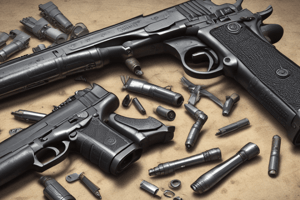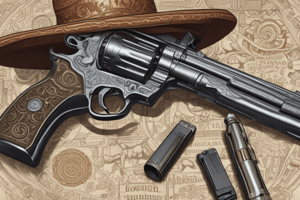Podcast
Questions and Answers
What is the primary concept that describes the legal system in the United States, allowing both federal and state laws to coexist?
What is the primary concept that describes the legal system in the United States, allowing both federal and state laws to coexist?
- Judicial review
- Separation of powers
- Federalism (correct)
- Checks and balances
Federal laws regarding firearms apply only in certain states.
Federal laws regarding firearms apply only in certain states.
False (B)
What amendment to the Constitution guarantees the right to keep and bear arms?
What amendment to the Constitution guarantees the right to keep and bear arms?
Second Amendment
The laws governing the purchase of firearms and ammunition may vary greatly at the _____ level.
The laws governing the purchase of firearms and ammunition may vary greatly at the _____ level.
Match the following levels of government with their respective responsibilities regarding gun laws:
Match the following levels of government with their respective responsibilities regarding gun laws:
How long has the legal debate around the Second Amendment been active?
How long has the legal debate around the Second Amendment been active?
Firearm transactions in the U.S. are only subject to state regulations.
Firearm transactions in the U.S. are only subject to state regulations.
What central government city is mentioned as the headquarters for federal lawmaking?
What central government city is mentioned as the headquarters for federal lawmaking?
What is the minimum age to purchase ammunition for handguns in the United States?
What is the minimum age to purchase ammunition for handguns in the United States?
Civilians in the US can own nuclear weapons legally.
Civilians in the US can own nuclear weapons legally.
Name two laws that guide the ATF regulations on firearms in the US.
Name two laws that guide the ATF regulations on firearms in the US.
To legally purchase ammunition, a person must not be a ______ person.
To legally purchase ammunition, a person must not be a ______ person.
Match the following federal firearm laws with their key features:
Match the following federal firearm laws with their key features:
What federal organization primarily regulates firearms and ammunition in the US?
What federal organization primarily regulates firearms and ammunition in the US?
A person can purchase firearms without providing any form of identification.
A person can purchase firearms without providing any form of identification.
What form must be filled out when legally buying a firearm at an FFL?
What form must be filled out when legally buying a firearm at an FFL?
The tax rate on rifles and shotguns is ______ percent.
The tax rate on rifles and shotguns is ______ percent.
Which of the following is NOT a restriction on ammunition purchase?
Which of the following is NOT a restriction on ammunition purchase?
Explosives are generally allowed for civilian ownership with no restrictions.
Explosives are generally allowed for civilian ownership with no restrictions.
What is the main drawback of owning a machine gun manufactured after 1986?
What is the main drawback of owning a machine gun manufactured after 1986?
The ______ process can involve a lengthy waiting period and additional fees for NFA items.
The ______ process can involve a lengthy waiting period and additional fees for NFA items.
Match the following terms with their definitions:
Match the following terms with their definitions:
Flashcards
Federalism
Federalism
A system where power is divided between a central government and smaller state governments.
Federal Laws
Federal Laws
Laws created by the federal government, applying to all states.
State Laws
State Laws
Laws that are made by state governments, which may have variations.
2nd Amendment
2nd Amendment
Signup and view all the flashcards
Firearms Transactions
Firearms Transactions
Signup and view all the flashcards
US Constitution
US Constitution
Signup and view all the flashcards
Second Amendment
Second Amendment
Signup and view all the flashcards
Federal Gun Laws
Federal Gun Laws
Signup and view all the flashcards
ATF (Bureau of Alcohol, Tobacco, Firearms, and Explosives)
ATF (Bureau of Alcohol, Tobacco, Firearms, and Explosives)
Signup and view all the flashcards
Ammunition Purchase Restrictions
Ammunition Purchase Restrictions
Signup and view all the flashcards
Prohibited Person
Prohibited Person
Signup and view all the flashcards
National Firearms Act (NFA) of 1934
National Firearms Act (NFA) of 1934
Signup and view all the flashcards
Firearm Owners Protection Act (FOPA) of 1986
Firearm Owners Protection Act (FOPA) of 1986
Signup and view all the flashcards
NFA Items
NFA Items
Signup and view all the flashcards
Federal Firearms License (FFL)
Federal Firearms License (FFL)
Signup and view all the flashcards
ATF Form 4473
ATF Form 4473
Signup and view all the flashcards
Gun Sales Tax
Gun Sales Tax
Signup and view all the flashcards
Nuclear Materials
Nuclear Materials
Signup and view all the flashcards
Age Restrictions (Ammunition)
Age Restrictions (Ammunition)
Signup and view all the flashcards
FFL Type 1
FFL Type 1
Signup and view all the flashcards
FFL Type 3
FFL Type 3
Signup and view all the flashcards
ATF Database Restrictions
ATF Database Restrictions
Signup and view all the flashcards
Federal Law Restrictions
Federal Law Restrictions
Signup and view all the flashcards
Study Notes
Federal Gun and Ammunition Laws
- Federalism: The US has a dual-level government system (federal and state/local). Federal laws apply everywhere, but state laws can vary.
- Second Amendment: Guarantees the right to bear arms, but the exact interpretation has been debated for over 200 years.
- Federal Regulations: Focus on buying and owning firearms as per federal laws; doesn't cover state laws.
- Nuclear Materials Restrictions: The federal government tightly regulates nuclear materials, restricting civilian ownership and production, including depleted uranium rounds.
- ATF (Bureau of Alcohol, Tobacco, Firearms, and Explosives) Role: Enforces federal firearm laws; can't maintain a searchable database of owners.
- Ammunition Restrictions: Age requirements (18 for rifles/shotguns, 21 for handguns) and prohibition of sales to prohibited persons (e.g., felons, domestic violence offenders, mentally unfit).
- National Firearms Act (NFA) of 1934: Defines specific firearm types (short-barreled rifles/shotguns, suppressors) and institutes a tax stamp process for ownership/manufacturing.
Firearm Ownership Process
-
Firearm Owners Protection Act of 1986: Prohibited new machine gun sales and mandated registration of pre-1986 machine guns leading to high costs for these.
-
Federal Firearms Licenses (FFLs): Certain businesses are licensed (FFLs) to buy and sell firearms for others.
-
FFL Types: Types 1 (gun dealers), 3 (pawnbrokers) are common.
-
ATF Form 4473: A form used for federal background checks of firearm purchasers at FFLs. This information cannot be kept in a searchable database.
-
NFA Items (e.g., machine guns): Involve more paperwork, fingerprints, a longer process, and a $200 tax stamp.
-
Typical Purchase Process: The ATF requires a form, and a valid ID if it is determined that no significant restrictions are in place.
Sales Tax on Firearms/Ammunition
- Federal Taxes: 10% on pistols/revolvers and 11% on rifles, shotguns, and ammunition.
- State Taxes: Sales taxes on firearm purchases are also assessed in addition to the federal taxes.
Studying That Suits You
Use AI to generate personalized quizzes and flashcards to suit your learning preferences.




